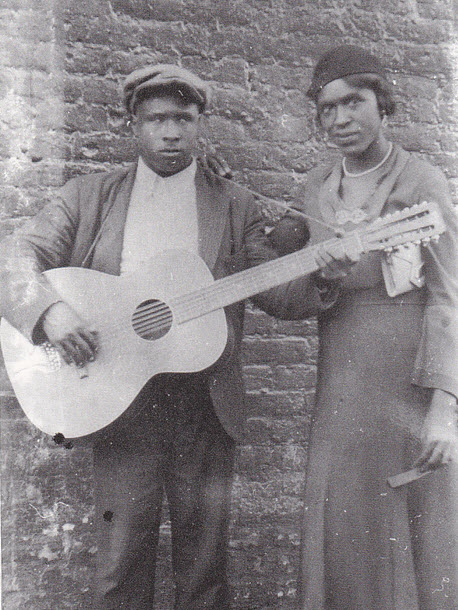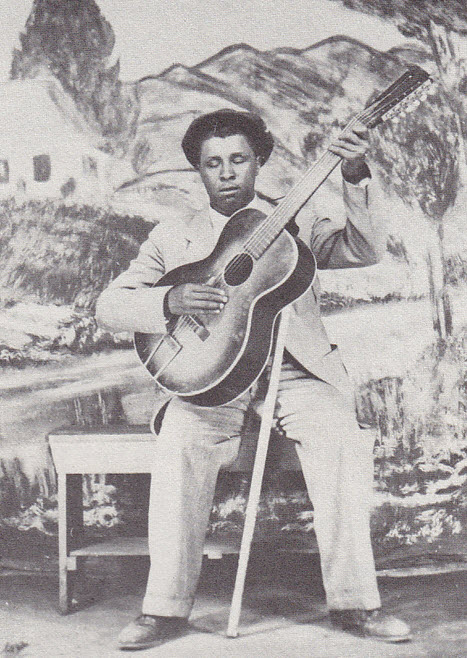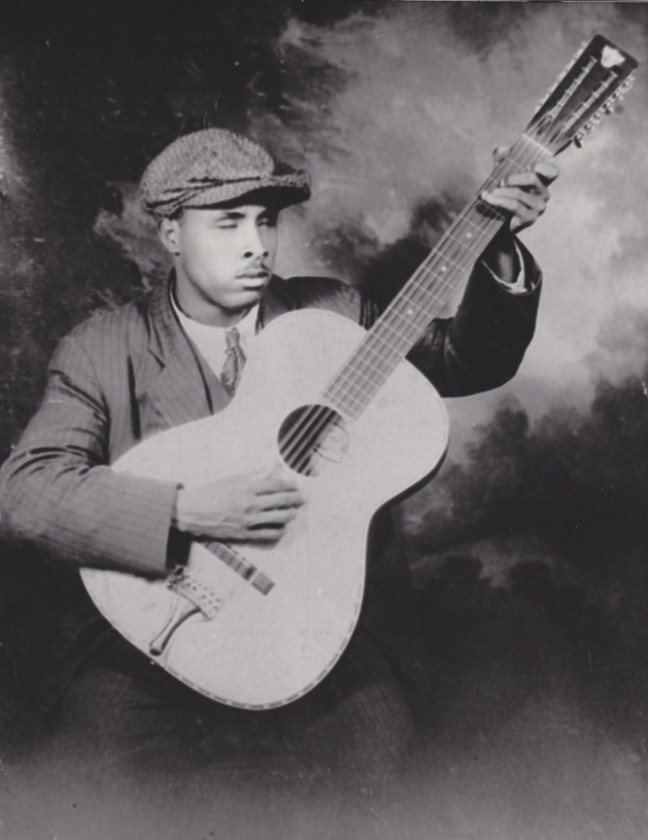May 5: Blind Willie McTell was born in 1898
And I know no one can sing the blues
Like Blind Willie McTell
~Bob Dylan (“Blind Willie McTell”)He was a songster of wide repertoire and as fine a 12-string guitarist as ever lived. The dexterity of his playing was extraordinary, and his voice was an unusually smooth tenor. The interplay between voice and guitar also brought into the equation McTell’s intelligence and wit, and it was the fusion of all these elements that led Bob Dylan to write in his 1983 tribute song that ‘no-one can sing the blues like Blind Willie McTell.’
~Michael Gray (The Bob Dylan Encyclopedia)
Willie Samuel McTell was one of the blues’ greatest guitarists, and also one of the finest singers ever to work in blues.
~Bruce Eder (allmusic.com)
Statesboro Blues:
Wikipedia:
| Birth name | William Samuel McTier |
|---|---|
| Also known as | Blind Sammie, Georgia Bill, Hot Shot Willie, Blind Willie, Barrelhouse Sammy, Pig & Whistle Red, Blind Doogie, Red Hot Willie Glaze, Red Hot Willie, Eddie McTier |
| Born | May 5, 1898 Thomson, Georgia, U.S. |
| Origin | Statesboro, Georgia, U.S. |
| Died | August 19, 1959 (aged 61) Milledgeville, Georgia, U.S. |
| Genres | Country blues, Piedmont blues, ragtime, Delta blues, gospel |
| Occupations | Musician, songwriter, songster, accompanist, preacher |
| Instruments | Vocals, guitar, harmonica, accordion, kazoo, violin |
| Years active | 1927–1956 |
Blind Willie McTell (born William Samuel McTier May 5, 1898 – August 19, 1959), was a Piedmont and ragtime blues singer and guitarist. He played with a fluid, syncopated fingerstyle guitar technique, common among many exponents of Piedmont blues, although, unlike his contemporaries, he came to use twelve-string guitars exclusively. McTell was also an adept slide guitarist, unusual among ragtime bluesmen. His vocal style, a smooth and often laid-back tenor, differed greatly from many of the harsher voice types employed by Delta bluesmen, such as Charley Patton. McTell embodied a variety of musical styles, including blues, ragtime, religious music and hokum.
 Blind Willie and Kate McTell in Atlanta, 1930s
Blind Willie and Kate McTell in Atlanta, 1930s
Travelin’ Blues:
Born blind in the town of Thomson, Georgia, McTell learned how to play guitar in his early teens. He soon became a street performer around several Georgia cities including Atlanta and Augusta, and first recorded in 1927 for Victor Records. Although he never produced a major hit record, McTell’s recording career was prolific, recording for different labels under different names throughout the 1920s and 30s. In 1940, he was recorded by John Lomax for the Library of Congress’s folk song archive. He would remain active throughout the 1940s and 50s, playing on the streets of Atlanta, often with his longtime associate, Curley Weaver. Twice more he recorded professionally. McTell’s last recordings originated during an impromptu session recorded by an Atlanta record store owner in 1956. McTell would die three years later after suffering for years from diabetes and alcoholism. Despite his mainly failed releases, McTell was one of the few archaic blues musicians that would actively play and record during the 1940s and 50s. However, McTell never lived to be “rediscovered” during the imminent American folk music revival, as many other bluesmen would.
McTell’s influence extended over a wide variety of artists, including The Allman Brothers Band, who famously covered McTell’s “Statesboro Blues”, and Bob Dylan, who paid tribute to McTell in his 1983 song “Blind Willie McTell”; the refrain of which is, “And I know no one can sing the blues, like Blind Willie McTell”. Other artists influenced by McTell include Taj Mahal, Alvin Youngblood Hart, Ralph McTell, Chris Smither and The White Stripes.
 Blind Willie McTell, circa 1950
Blind Willie McTell, circa 1950
You Was Born To Die (1933):
Bob Dylan has paid tribute to McTell on at least four occasions:
- Firstly, in his 1965 song “Highway 61 Revisited“, the second verse begins with “Georgia Sam he had a bloody nose”, referring to one of Blind Willie McTell’s many recording names
- later in his song “Blind Willie McTell“, recorded in 1983 but released in 1991 on The Bootleg Series Volumes 1-3
- then with covers of McTell’s “Broke Down Engine” and “Delia” on his 1993 album, World Gone Wrong
- in his song “Po’ Boy“, on 2001’s “Love & Theft”, which contains the lyric, “had to go to Florida dodging them Georgia laws”, which comes from McTell’s “Kill It Kid”
Bob Dylan – Blind Willie McTell – Hollywood Palladium Theater, Los Angeles, California – 12 January 2012:
Check out this great post @ jasobrecht.com:
—
“Atlanta Twelve String” (recorded 1949 / released 1975) – Full album:
-Egil


Wonderful performance, thanks for posting this!!!!!
The first Willie McTell Record I ever acquired was Melodeon MLP 7323 “Blind Willie McTell, 1940 – The Legendary Library of Congress Session.” I was initially a bit disappointed because it did not have “Statesboro Blues” on it ( I bought it because it was the only Blind Willie McTell album in the bin on that day). ‘Turns out, though, it was a great choice. The tune list is interesting, well-played of course, and pretty diverse style-wise. But the big plus re: that particular album is the inclusion of a whole lot of recorded interview dialog between Willie McTell and John Lomax. It’s certainly a rare thing to to be able to hear one of the original blues greats talk about his/her life and craft, and to get a feel for who they are when they are not performing a song. Mr. McTell had a very unique way of speaking, as well as a great memory for details. He had a sharp mind and a profound ability to navigate the world in spite of his blindness. For the record, the interview segments paint a less flattering picture of Mr. Lomax; but he did hunt out, find, and record Mr. McTell. Also: I kind of remember that the CD reissue of this vinyl album has a different song order, and perhaps some extra minutes of recording that do not exist on the old vinyl.
Thanks for the great comment CalypsoJimmy!